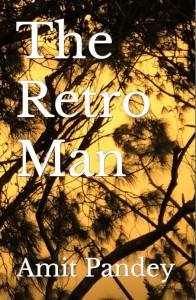There is so much literature attempting to capture a woman’s point of view. Epics are being rewritten from the viewpoint of its female characters. Contemporary literature is mostly talking about what a woman goes through, at various phases of her life, especially when she grows up in a family that has a gender bias. Or after she gets married and has to deal with a whole lot of changes and expectations. How the motherhood changes her priorities in life. The times when she has to deal with all kinds of biases and ill-treatment at career front. The Retro Man by Amit Pandey attempts to do the opposite.
How about a contemporary man’s view? His dealings with sibling rivalry growing up? How does he deal with parents who he does not necessarily get along with? His choice between joining the dream profession of his family or following his heart? The man balancing the equation between his family and his new wife? How does he deal with being a father? The dynamics of his friendships changing after marriage? What are the sacrifices that he silently makes to keep his family safe and secure? All this while not really talking about what he does.
If you ever feel like listening to a cathartic talk by a man – read The Retro Man by Amit Pandey. Through a dialogue between two friends, the protagonist, who I assume is an alter ego of the author himself, takes the reader through a series of relationships that a man deals with – right from parents to siblings, to wife, to kids, and of course friends. In the end, there is a dose of philosophy that may be too idealistic to believe but then you cannot deny the truth hidden in it.
We hardly hear a man talk about his dealing with difficult parents or a more successful sibling. What we do hear is about their struggle with some of the creative professions but never within the regular ones. We hardly pay heed to the adjustments they make to keep their marriages in place, the little joys of life that they give up and the constant temptations that they try not to give in to.
I had not read such a perspective ever in a book, so from that perspective, The Retro Man by Amit Pandey, was a very interesting book for me. Language is simple and conversational. Author makes a point in every chapter and illustrates it with an example and he does it with so much discipline that I felt he was following a formula to the T. What I would have liked a bit more is the setting of the story – it is set in a home but where is that home is missing – a backdrop of a city/town/state would have firmly placed the story in a place. At places, the dialogues became too long and thus boring to read. I think a little more Rasa would have helped. But then I am nitpicking.
There is an inclination to be an idealist, the author deals with it right in the beginning by calling himself a retro man. Someone who belongs to another generation and probably a misfit in today’s fast-moving world. I would say men like him exist, quite a few of them in today’s world. And others can probably take inspiration from them as these men seem to be leading a relatively stable life.
All in all, I guess this is an important piece of work. Lots of men should celebrate this work and women should read this to understand men around them.
Read it.
You may buy this book – The Retro Man by Amit Pandey at Amazon.










good review.
reminds me of a reference to urmila of the ramayana where her being away from husband laxman andher supreme sacrifice is not so much eulogised from the gender bias point of view.
also the recent praises on duryodhana, ravana for thieir + ve traits and commitments r not dealt with in the epics.
a real paradigm shift and a chery on the cake for writers who want to rewrite such epic tales from a difeerent perspective,
good 1.
Nice review. I read this book and quite enjoyed it.
“Epics are being written from a women’s POV.” This caught my eye Anuradha. I have recently felt the same thing. But how successful are we to understand how the women during those days felt? Polygamy being rampant, losing ‘their lord’ in the wars, Sati and if one raised a voice, she was removed from the pages of history like her existence never mattered. Today the ‘abla nari’ syndrome is still prevalent. Do you think that the writers have really understood what the women felt during those days?
Rubina, I think women have been an equal partners in history, but not written history.
If there was polygamy, there was polyandry too. Sati, in my understanding was choice and not a forced decision. If Ramayana was centered around a man who chooses his duty over his wife, then Mahabharata was centered around women who wanted revenge or women who wanted things there way – it all starts with Satyavati’s demands. In fact in Ramayana also it was Kekayi’s demands. I sometimes feel we take the gender debate too far and miss the main motive of these stories.
Also remember that all the written history is very recent. We had oral tradition where may be we were not so sidelined. We would never know how the women or for that matter men felt in those days.